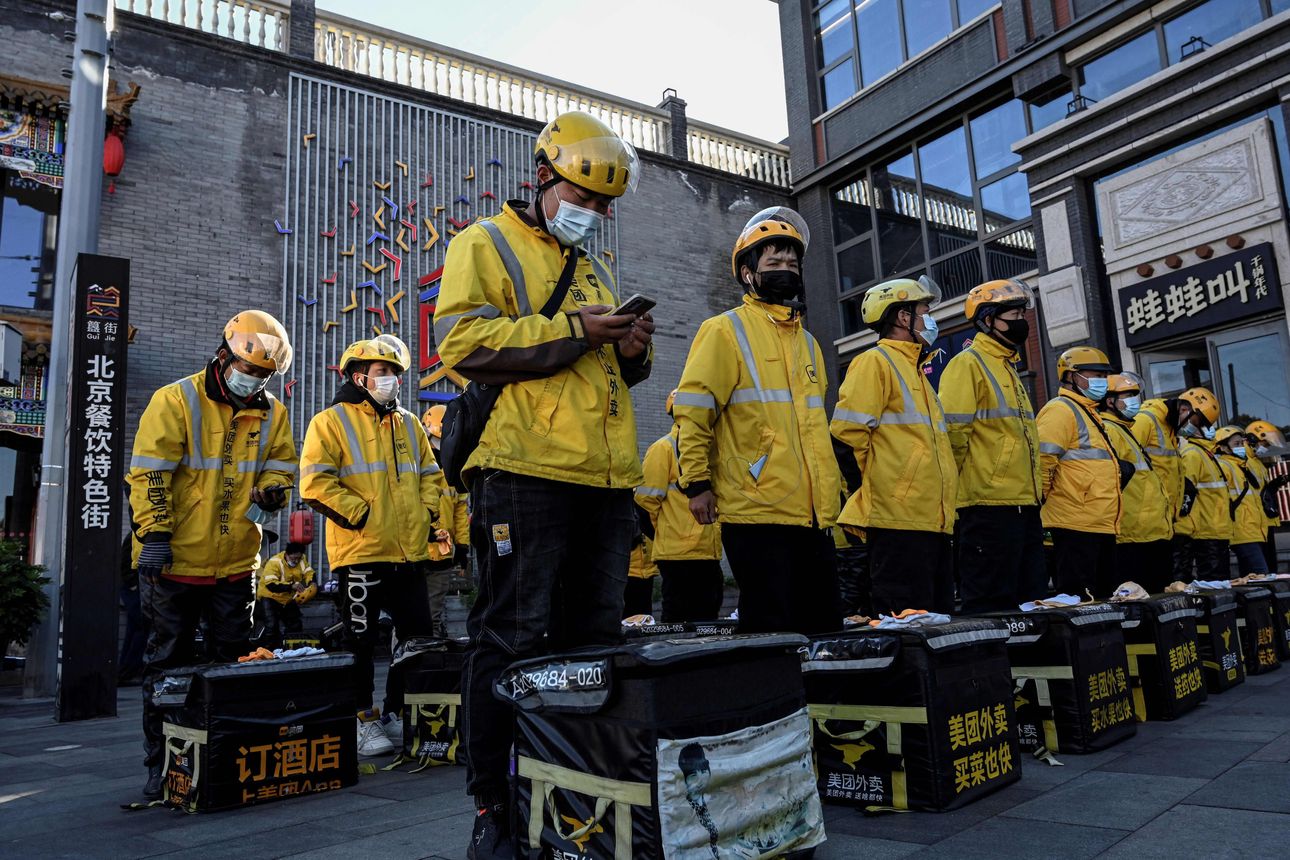For Chinese Tech Stocks, No News Is Good News
Hang Seng Tech Index has clawed back 11% after hitting a trough last week.
Shares in major Chinese technology companies like JD.com Inc. and Meituan jumped Wednesday, adding to a recent rebound that suggests some investors see good value in the sector after a bruising 2021.
Analysts and investors said there was no clear catalyst for the rally in Hong Kong-listed Chinese tech stocks. But they said buyers appeared to be reassessing the sector in the new year, given lower valuations and an apparent lull in new action from Beijing.
After roughly a year under siege, the sector was finally benefiting from a lack of new measures, said Qi Wang, chief executive of MegaTrust Investment (HK).
“The Chinese government now needs to give companies the time to digest and comply with these new rules,” Mr. Wang said.
Meituan and JD.com stock jumped 9% and 11%, respectively, in Hong Kong trading. That helped lift the city’s Hang Seng Tech Index by 5%.
The index, which launched in July 2020, has now recovered nearly 11% since it hit a record closing low last Wednesday, the same day that China’s antitrust watchdog levied small fines on Alibaba Group Holding Ltd., Bilibili Inc., and Tencent Holdings Ltd. The gauge fell by roughly a third last year.
Several small rallies in recent months have petered out, but this rebound could prove more enduring if the slower pace of regulatory action continues, said Chetan Seth, Asia-Pacific equity strategist at Nomura. He added that “the companies themselves are geared to some very exciting long-term investment themes.”
David Chao, global market strategist for Asia-Pacific at Invesco, said his firm had “taken a much more constructive view” on Chinese shares, especially in tech, for this year compared with last year.
As of Tuesday, shares in sector heavyweight Tencent traded at a price of about 24 times expected earnings, data compiled by Refinitiv showed, down from 29 times a year earlier.
Other major gainers on Wednesday included Alibaba, Baidu Inc. and Bilibili, whose Hong Kong-traded shares each rose about 6%. All three are also listed in the U.S.
Some market watchers remain wary. Marcella Chow, global market strategist at J.P. Morgan Asset Management, said the annual meeting of China’s legislature, the National People’s Congress, in March should provide more regulatory certainty.
“Frankly, we are now taking a wait-and-see approach until [there is] more policy clarity on the China tech sector,” Ms. Chow said.
Reprinted by permission of The Wall Street Journal, Copyright 2021 Dow Jones & Company. Inc. All Rights Reserved Worldwide. Original date of publication. January 12, 2022.
 Copyright 2020, Dow Jones & Company, Inc. All Rights Reserved Worldwide. LEARN MORE
Copyright 2020, Dow Jones & Company, Inc. All Rights Reserved Worldwide. LEARN MORE
This stylish family home combines a classic palette and finishes with a flexible floorplan
Just 55 minutes from Sydney, make this your creative getaway located in the majestic Hawkesbury region.
Continued stagflation and cost of living pressures are causing couples to think twice about starting a family, new data has revealed, with long term impacts expected
Australia is in the midst of a ‘baby recession’ with preliminary estimates showing the number of births in 2023 fell by more than four percent to the lowest level since 2006, according to KPMG. The consultancy firm says this reflects the impact of cost-of-living pressures on the feasibility of younger Australians starting a family.
KPMG estimates that 289,100 babies were born in 2023. This compares to 300,684 babies in 2022 and 309,996 in 2021, according to the Australian Bureau of Statistics (ABS). KPMG urban economist Terry Rawnsley said weak economic growth often leads to a reduced number of births. In 2023, ABS data shows gross domestic product (GDP) fell to 1.5 percent. Despite the population growing by 2.5 percent in 2023, GDP on a per capita basis went into negative territory, down one percent over the 12 months.
“Birth rates provide insight into long-term population growth as well as the current confidence of Australian families,” said Mr Rawnsley. “We haven’t seen such a sharp drop in births in Australia since the period of economic stagflation in the 1970s, which coincided with the initial widespread adoption of the contraceptive pill.”
Mr Rawnsley said many Australian couples delayed starting a family while the pandemic played out in 2020. The number of births fell from 305,832 in 2019 to 294,369 in 2020. Then in 2021, strong employment and vast amounts of stimulus money, along with high household savings due to lockdowns, gave couples better financial means to have a baby. This led to a rebound in births.
However, the re-opening of the global economy in 2022 led to soaring inflation. By the start of 2023, the Australian consumer price index (CPI) had risen to its highest level since 1990 at 7.8 percent per annum. By that stage, the Reserve Bank had already commenced an aggressive rate-hiking strategy to fight inflation and had raised the cash rate every month between May and December 2022.
Five more rate hikes during 2023 put further pressure on couples with mortgages and put the brakes on family formation. “This combination of the pandemic and rapid economic changes explains the spike and subsequent sharp decline in birth rates we have observed over the past four years,” Mr Rawnsley said.
The impact of high costs of living on couples’ decision to have a baby is highlighted in births data for the capital cities. KPMG estimates there were 60,860 births in Sydney in 2023, down 8.6 percent from 2019. There were 56,270 births in Melbourne, down 7.3 percent. In Perth, there were 25,020 births, down 6 percent, while in Brisbane there were 30,250 births, down 4.3 percent. Canberra was the only capital city where there was no fall in the number of births in 2023 compared to 2019.
“CPI growth in Canberra has been slightly subdued compared to that in other major cities, and the economic outlook has remained strong,” Mr Rawnsley said. “This means families have not been hurting as much as those in other capital cities, and in turn, we’ve seen a stabilisation of births in the ACT.”
This stylish family home combines a classic palette and finishes with a flexible floorplan
Just 55 minutes from Sydney, make this your creative getaway located in the majestic Hawkesbury region.






















